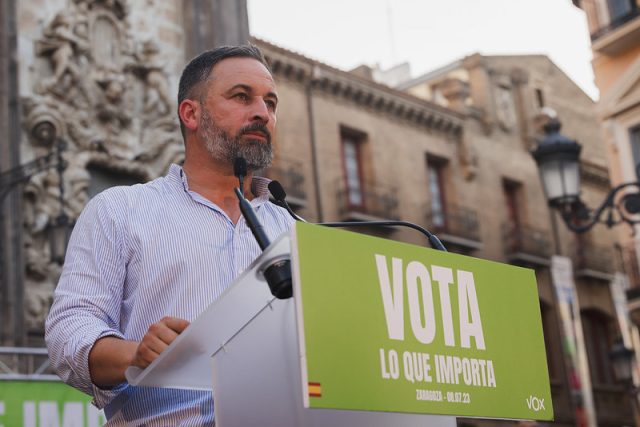
In the campaign for the Spanish General Election four main political parties launched their governing programmes, and party leaders are doing rounds around the county to convey their ideas. ECR’s Vox and its president, Santiago Abascal, have included one section in theirs titled “Europe”. They highlight Vox’s perspective on the role of the European institutions in a manner consistent with ECR’s vision “for a reformed European Union”.
Vox’s programme explains that the European Union “has drifted”. To them, the leadership of the Union advocates for “the dissolution of the sovereignty of Member States” and their submission to the “ecological and radical” international lobbies. Throughout the weekend, Abascal alluded to this point in his rallies. Vox’s outlook for Spain’s relations with the European Union does not intend to dissolve the constellation of supranational institutions, but rather ensure that the Union best serves the interests of Member States, and their citizens, not the opposite. “We defend a European Union of free and sovereign nations that freely cooperate between them through its institutions”.
The programme goes on listing 18 different action points Vox will implement, should it have enough seats in Congress to enter a coalition government. In Madrid, Vox would enact resolutions to cease the cooperation agreement on agriculture with the Kingdom of Morocco, to encourage the construction of pipelines to increase Spanish gas exports to other Member States, and to start negotiations with the United Kingdom to regain Spanish sovereignty over Gibraltar.
In Brussels, Vox’s lager goal is to push for a new European Treaty that gives power back to Member States “from the unelected and unaccountable European Commission bureaucracy”. Vox also intends to reform and adjust Spain’s Recovery Plan, and reform the European Union’s immigration and asylum policies, given the “failures of the multicultural model imposed by the Brussels’ elites”.
The programme also sets out measures to reduce bureaucratic spending in Brussels and Strasbourg and return the unanimity rule to the European Council. On competitiveness and climate change, Vox will demand a cease on the prohibition to manufacture gasoline cars from 2035 and a suspension and revision of the European Green Deal that, in its current form, hurts Spanish farmers.
One novel part of Vox’s program—when compared to the rest of Spanish political parties’—is its focus on what they call the Iberosfera, i.e., the community of nations that share history, language, and culture with the Iberian Peninsula. To Abascal, Spain has focused much of its foreign policy on Europe and has neglected the Iberosfera to such degree that communist forces who defend anti-democratic, anti-Spanish, and anti-European values are now thriving in several countries of Hispanic-America and Brazil. Should Vox join a coalition government in Spain, it would leverage the rest of the Spanish Presidency of the Council of the European Union to serve as a bridge between our European community and the countries at the other side of the Atlantic. This outlook would increase the European Union’s geopolitical standing, independence, and influence.
Spaniards will head to the polls in less than 20 days. Forecasts are now divided, but most of them give EPP’s Popular Party and its leader, Alberto Núñez Feijóo, the victory, but not a majority. To hit the 176 seats in Parliament, Feijóo will need to govern in coalition with Abascal’s MPs (or negotiate the abstention of the Socialist Party). In the past seven years, the PP and Vox have reached regional agreements in Andalucía, Castilla León, Extremadura, Madrid, Valencia, and the Balearic Islands. Though Feijóo has tried to distance himself from Abascal, the only sensible path for him to govern is to join forces with Vox. There is no other way to offer Spain and Europe an alternative.



 Subscribe
Subscribe